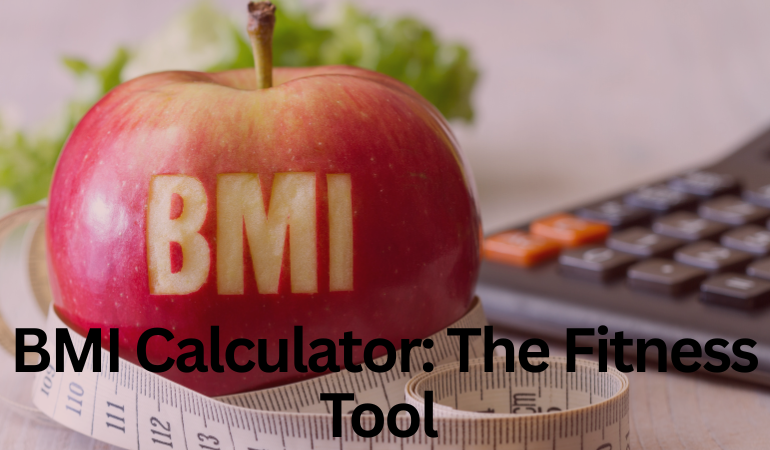BMI Calculator: The Fitness Tool Everyone’s Using

What is a BMI Calculator and Why Does It Matter?
A BMI Calculator is a widely used tool that helps individuals assess their body mass index (BMI), a key indicator of whether a person is underweight, normal weight, overweight, or obese. It uses your height and weight to produce a number that reflects your general body composition. This number can be a useful starting point for understanding your overall health status.
The BMI Calculator is particularly valuable because it offers a quick snapshot of your fitness level. While it doesn’t measure body fat directly, it provides a useful approximation that can guide lifestyle changes. Whether you’re aiming to lose weight, gain muscle, or simply stay in shape, knowing your BMI helps you make more informed decisions.
For many, pairing a BMI Calculator with a BMI fitness tracker offers even more insights. Trackers often include additional metrics like heart rate, activity levels, and calories burned, helping you stay consistent with your fitness goals.
Using a BMI Calculator isn’t just for athletes or gym-goers—it’s for anyone who wants to take control of their health. By regularly monitoring your BMI, you can catch potential issues early and stay on track toward a healthier lifestyle.
How the BMI Calculator Works
Understanding how a BMI Calculator functions is key to using it effectively. It’s based on a simple mathematical formula: weight in kilograms divided by height in meters squared (kg/m²). This straightforward calculation places you into a category—underweight, normal weight, overweight, or obese—based on your BMI result.
While the formula is simple, the insights can be powerful. A BMI between 18.5 and 24.9 is typically considered healthy. Falling below or above this range may signal potential health concerns, prompting further action. The BMI Calculator gives you a clear picture of where you stand.
In today’s digital age, many BMI fitness tracker apps and devices automatically compute your BMI and even track your progress over time. These tools integrate your BMI data with daily activity, nutrition, and sleep, providing a comprehensive health profile.
The BMI Calculator is especially effective when used consistently. Checking your BMI monthly—or after major fitness or dietary changes—helps you stay on top of your health and fitness journey. Whether you’re adjusting your diet or ramping up your workout routine, knowing your BMI ensures your efforts are aligned with measurable results.
The Role of a BMI Calculator in Personal Fitness Goals
Whether you’re working toward weight loss, muscle gain, or improved stamina, a BMI Calculator is a useful companion in your fitness toolkit. It helps set a benchmark and measure progress over time, offering valuable insight into how lifestyle changes are impacting your health.
By inputting your data regularly, the BMI Calculator keeps you grounded in reality. If your goal is to reduce body fat, your BMI should decrease. If you’re building muscle mass, you may see a different shift—but tracking the trend helps adjust your strategy accordingly.
Combining a BMI fitness tracker with your calculator gives you a deeper view of your progress. While BMI offers a high-level overview, fitness trackers provide daily metrics like activity levels, calories burned, and sleep patterns—important data points that influence your overall wellness.
The true value of a BMI Calculator is in its ability to motivate. Seeing the numbers move in a positive direction encourages consistency and helps you stay focused. It turns vague goals like “get fit” into actionable, trackable objectives. No matter where you start, having this tool keeps your health journey clear and accountable.
Is BMI Always Accurate? Understanding Its Limitations
While the BMI Calculator is widely respected, it’s not without flaws. One major limitation is that it doesn’t distinguish between fat and muscle mass. For example, a muscular athlete might have a high BMI but low body fat—misleadingly categorizing them as overweight.
This is where a BMI fitness tracker becomes useful. These devices often offer body composition analysis, helping users distinguish between fat, muscle, and water weight. When used in combination with a BMI Calculator, you get a more balanced perspective on your health.
Other factors like age, gender, and ethnicity can also affect BMI interpretations. Older adults, for example, may have more body fat at the same BMI as younger individuals. That’s why BMI should be used as one of several tools in assessing health, not the only one.
Still, the BMI Calculator provides a valuable baseline. It’s particularly effective when used over time to spot trends. If your BMI is increasing or decreasing, it signals that your body is changing. To ensure accuracy, pair it with tools that go beyond the surface, like fitness trackers or professional assessments.
How to Use a BMI Calculator Correctly
Using a BMI Calculator is straightforward, but getting accurate results depends on correct inputs. Always measure your weight and height using reliable tools. Enter weight in kilograms and height in meters (or use converters if needed), then let the calculator do the rest.
Many modern BMI fitness tracker apps offer auto-calculations once you input your stats. They also save your BMI history so you can track progress over time. This is incredibly helpful for setting realistic fitness goals and monitoring the impact of changes in diet or exercise.
To get the most out of your BMI Calculator, use it regularly and in conjunction with other metrics. Don’t rely solely on a one-time result. If your BMI changes dramatically in a short period, consult a healthcare provider to ensure there’s no underlying issue.
Consistency is key. Make it a monthly habit to input your data, review the changes, and adjust your plan accordingly. That way, your BMI Calculator becomes a true ally in your wellness journey, helping you move forward with confidence and clarity.
The Best BMI Fitness Tracker Tools in 2025
As technology advances, so do the tools that support our health. The latest BMI fitness tracker apps and devices do more than calculate BMI—they integrate AI to analyze trends and provide personalized feedback. These innovations elevate the role of the BMI Calculator from a simple tool to a smart companion.
Popular fitness trackers now sync with health apps, offering real-time BMI calculations along with daily fitness data. Brands like Fitbit, Garmin, and Apple Watch allow users to track their BMI automatically after logging height and weight.
These trackers also notify users of significant shifts in BMI, encouraging timely action. For instance, if your BMI increases over a few weeks, your device might prompt you to review your eating or activity habits. This feature turns passive data into actionable insight.
Choosing the right BMI fitness tracker depends on your lifestyle and goals. Whether you need a simple app or a robust wearable, the key is consistency. Use the tracker alongside a BMI Calculator to stay on top of your health goals in 2025 and beyond.
BMI Calculators vs Other Health Metrics
The BMI Calculator is just one part of the health assessment puzzle. Other metrics like body fat percentage, waist-to-hip ratio, and resting heart rate provide a fuller picture of your fitness and health.
While BMI is great for population-wide health studies and general benchmarks, it can be complemented by tools that assess individual differences. A BMI fitness tracker often includes these other data points, giving users a more nuanced look at their well-being.
For example, two people with the same BMI might have very different health profiles. One might have more lean muscle mass, while the other has a higher fat percentage. That’s why combining the BMI Calculator with other metrics improves accuracy and helps you make better health decisions.
In essence, don’t rely solely on your BMI. Use it as a starting point and pair it with other tools to get a comprehensive view. The goal isn’t just hitting a number—it’s achieving overall wellness and sustaining it long-term.
Tips for Maintaining a Healthy BMI
Maintaining a healthy BMI involves a combination of smart eating, regular exercise, and consistent monitoring. Using a BMI Calculator helps you stay aligned with your goals and make necessary adjustments along the way.
Start with a balanced diet rich in whole foods—fruits, vegetables, lean proteins, and whole grains. Avoid fad diets that promise quick fixes; they often lead to yo-yo weight changes that disrupt your BMI long-term. Instead, aim for sustainable habits.
Incorporate regular physical activity—whether it’s walking, lifting weights, or doing yoga. Exercise not only helps manage weight but also improves heart health, mood, and energy levels. Pair this with a BMI fitness tracker to monitor activity levels and adjust when needed.
Regularly using your BMI Calculator lets you catch small changes before they become major setbacks. It reinforces healthy habits and encourages accountability. When combined with a tracker, you get a full-circle view of how your lifestyle choices affect your health.
Conclusion: Why the BMI Calculator is Still a Must-Have Tool
Despite its limitations, the BMI Calculator remains one of the most accessible and effective tools for gauging your health. It gives quick, actionable insights that guide personal fitness decisions and help you stay on track.
Used consistently and wisely—especially alongside a BMI fitness tracker—it becomes more than a number. It becomes a motivational tool that supports long-term health and wellness.
If you’re serious about your health journey, don’t overlook the value of a BMI Calculator. Start tracking today, and let the data drive you toward better habits and a stronger, healthier version of yourself.






